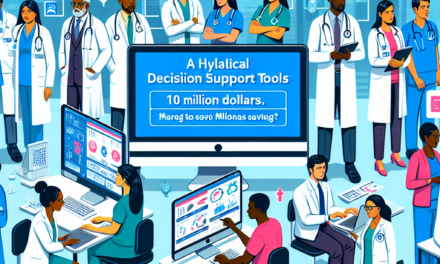Bali Hospital Achieves Stage 6 EMRAM Certification in Indonesia
The healthcare landscape in Indonesia has been evolving rapidly, with a significant focus on improving the quality of care through the adoption of advanced technologies and best practices. One of the most notable achievements in this regard is the recent attainment of Stage 6 EMRAM (Electronic Medical Record Adoption Model) certification by a prominent hospital in Bali. This article delves into the implications of this achievement, the journey to certification, and the broader impact on healthcare in Indonesia.
Understanding EMRAM Certification
The Electronic Medical Record Adoption Model (EMRAM) is a framework developed by the Healthcare Information and Management Systems Society (HIMSS) to assess the adoption and utilization of electronic medical records (EMRs) in healthcare organizations. The model consists of eight stages, with Stage 0 representing the absence of a comprehensive EMR system and Stage 7 indicating a fully optimized EMR environment.
Stage 6 signifies that a hospital has made significant strides in implementing advanced EMR functionalities, including:
- Comprehensive clinical documentation
- Clinical decision support systems
- Interoperability with other healthcare systems
- Patient engagement tools
Achieving Stage 6 EMRAM certification is a testament to a hospital’s commitment to improving patient care through technology. It indicates that the institution has not only adopted electronic records but has also integrated them into clinical workflows to enhance decision-making and patient outcomes.
The Journey to Stage 6 Certification
The journey to achieving Stage 6 EMRAM certification is often complex and requires a strategic approach. For the Bali hospital in question, this journey involved several key steps:
- Assessment of Current Systems: The hospital began by conducting a thorough assessment of its existing EMR systems and workflows. This involved identifying gaps in technology and areas for improvement.
- Stakeholder Engagement: Engaging stakeholders, including healthcare providers, IT staff, and administrative personnel, was crucial. Their input helped shape the direction of the EMR implementation.
- Investment in Technology: The hospital invested in advanced EMR solutions that offered robust functionalities, including interoperability and data analytics capabilities.
- Training and Education: Comprehensive training programs were developed to ensure that all staff members were proficient in using the new systems. This included ongoing education to keep pace with technological advancements.
- Continuous Improvement: The hospital adopted a culture of continuous improvement, regularly evaluating its processes and seeking feedback from users to enhance the EMR system.
Throughout this journey, the hospital faced challenges, including resistance to change from some staff members and the need for significant financial investment. However, the leadership remained committed to the vision of providing high-quality, technology-driven healthcare.
Impact on Patient Care and Safety
Achieving Stage 6 EMRAM certification has profound implications for patient care and safety at the Bali hospital. The integration of advanced EMR functionalities has led to several improvements:
- Enhanced Clinical Decision-Making: With access to comprehensive patient data, healthcare providers can make more informed decisions. Clinical decision support tools alert providers to potential issues, such as drug interactions or allergies.
- Improved Patient Engagement: The hospital has implemented patient portals that allow patients to access their health information, schedule appointments, and communicate with their healthcare providers. This fosters a sense of ownership over their health.
- Streamlined Workflows: The automation of administrative tasks has reduced the burden on staff, allowing them to focus more on patient care. This has led to shorter wait times and improved patient satisfaction.
- Data-Driven Quality Improvement: The hospital can analyze data from the EMR system to identify trends and areas for improvement. This data-driven approach supports initiatives aimed at enhancing the quality of care.
- Increased Safety Protocols: The EMR system includes safety protocols that help prevent medical errors. For example, alerts for abnormal lab results can prompt timely interventions.
These improvements not only enhance the patient experience but also contribute to better health outcomes. Studies have shown that hospitals with advanced EMR systems report lower rates of adverse events and improved patient satisfaction scores.
Broader Implications for Healthcare in Indonesia
The achievement of Stage 6 EMRAM certification by a Bali hospital is not just a local milestone; it has broader implications for the healthcare system in Indonesia. As more hospitals adopt advanced EMR systems, several trends are likely to emerge:
- Increased Standardization: The adoption of EMR systems can lead to more standardized practices across healthcare facilities, improving the overall quality of care.
- Interoperability Across Systems: As hospitals implement EMR systems, the potential for interoperability increases. This means that patient data can be shared seamlessly between different healthcare providers, enhancing continuity of care.
- Attracting International Patients: Hospitals that achieve high levels of EMR adoption may attract international patients seeking quality care. This can boost the local economy and enhance the reputation of Indonesian healthcare.
- Policy Development: The success of the Bali hospital may encourage policymakers to support initiatives aimed at promoting EMR adoption across the country, leading to improved healthcare infrastructure.
- Focus on Telemedicine: The integration of EMR systems can facilitate the growth of telemedicine services, allowing healthcare providers to reach patients in remote areas.
As Indonesia continues to develop its healthcare system, the lessons learned from the Bali hospital’s journey can serve as a model for other institutions aiming to enhance their technological capabilities.
Challenges and Future Directions
While the achievement of Stage 6 EMRAM certification is commendable, it is essential to recognize the challenges that lie ahead. Some of these challenges include:
- Ongoing Training Needs: As technology evolves, continuous training will be necessary to ensure that staff members remain proficient in using the EMR system.
- Data Security Concerns: With the increased use of electronic records comes the responsibility of safeguarding patient data. Hospitals must invest in robust cybersecurity measures to protect sensitive information.
- Integration with Legacy Systems: Many healthcare facilities still rely on outdated systems. Integrating these legacy systems with new EMR solutions can be complex and costly.
- Financial Constraints: Not all hospitals have the financial resources to invest in advanced EMR systems. Policymakers may need to consider funding initiatives to support these efforts.
- Resistance to Change: Cultural resistance to adopting new technologies can hinder progress. Hospitals must foster a culture that embraces innovation and change.
Looking ahead, the Bali hospital’s achievement can serve as a catalyst for further advancements in healthcare technology across Indonesia. By addressing these challenges and continuing to invest in EMR systems, hospitals can enhance patient care and safety, ultimately leading to better health outcomes for the population.
Conclusion
The achievement of Stage 6 EMRAM certification by a Bali hospital marks a significant milestone in Indonesia’s healthcare journey. This accomplishment reflects a commitment to leveraging technology to improve patient care, safety, and operational efficiency. As more hospitals follow suit, the potential for enhanced healthcare delivery in Indonesia becomes increasingly promising.
Through strategic planning, stakeholder engagement, and a focus on continuous improvement, the Bali hospital has set a precedent for others in the region. The implications of this achievement extend beyond the walls of the hospital, influencing the broader healthcare landscape in Indonesia and paving the way for future advancements.
In summary, the journey to Stage 6 EMRAM certification is a testament to the power of technology in transforming healthcare. As Indonesia continues to embrace digital health solutions, the lessons learned from this achievement will undoubtedly shape the future of healthcare in the country.





